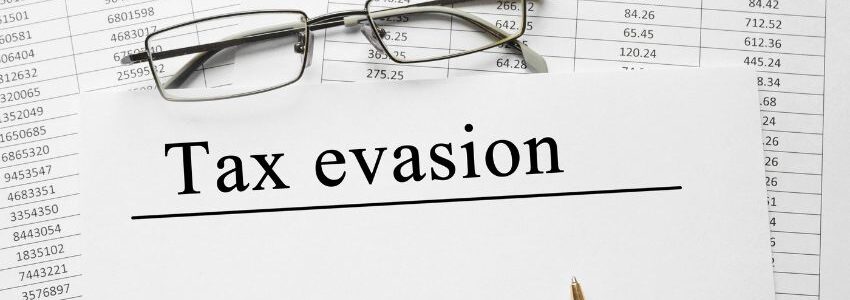Can You Go To Jail For Not Paying Taxes?

Published July 26, 2022
Taxes are the backbone of a country. Without it, the government won’t be able to function. There won’t be any money to build roads, schools, or hospitals. Nor will there be funds for public services or defense. This is how important taxation is in nation-building.
As such, punishment for crimes concerning taxes tends to be serious. So if you haven’t paid your taxes yet, you’re probably wondering: can you go to jail for not paying taxes?
The short answer is yes, you can go to jail for not paying taxes. But only if you did so on purpose. You can go to jail if you lied on your tax return or didn’t file one. But the government can’t prosecute you for not having enough money to pay taxes. Nor can you be held liable if you can prove that it was just an oversight on your part.
When Can You Go to Jail for Not Paying Taxes?
Not everyone who did not pay their taxes wanted to escape their obligation. There are a lot of other legitimate reasons why someone fails to pay their taxes.
It could be that the deadline slipped their mind, they’re in the hospital, or in some sort of emergency situation. Though it can also be that they are not in any financial position to pay taxes.
This is why tax crimes are classified into criminal and civil offenses. The former will definitely land you in jail but the civil tax offenses do not carry prison time. At most, you’ll be ordered to pay the taxes you owe along with some penalties.
So if it’s an honest mistake or an incapability to pay on your part, you’ll most likely be charged with civil offenses. But the following constitutes a criminal tax offense and can certainly send you to prison:
- willful failure to pay taxes owed
- not filing a federal income tax return on purpose
- not reporting all income
- making false or fraudulent claims in your tax return
- underreporting the number of employees
- collecting payroll taxes and not reporting them to the IRS
- paying employees in cash to avoid paying payroll taxes
That said, the IRS is usually more forgiving of people who failed to pay taxes because they can’t afford it as opposed to those who deliberately avoid paying taxes. That’s why the IRS doesn’t usually prosecute those who filed tax returns even if they cannot pay them.
Besides, if you can prove that you’re not financially capable of paying the taxes you owe, you might be able to avail of the IRS’s payment plan.

Punishment for Tax Crimes
There are two types of charges for tax-related offenses: civil and criminal.
Civil Penalties
Most of the tax-related offenses are civil in nature. Penalties for these types of offenses are less severe than criminal ones. In most cases, the offender will only be ordered to pay a fine with no corresponding jail time.
For instance, if the IRS conducts an audit and finds out that you still owe them money, civil charges will be brought against you. At most, you’ll be ordered to pay the taxes you owe plus the interest and penalties. Interest for unpaid taxes can range from 5% to 20% and they compound daily.
But if you deliberately trick the IRS to avoid paying the taxes and penalties you owe, you could be facing criminal charges.
Punishment for Criminal Tax Offenses
There are different types of tax-related criminal offenses and each offense carries different penalties. Some of them are:
Tax evasion
The IRS handbook defines tax evasion as the willful attempt to evade or defeat the assessment and payment of taxes. Thus, there are two kinds of tax evasion: evasion of assessment and evasion of payment.
Tax evasion charges carries a fine of up to $250,000 ($500,000 in case of corporations), imprisonment for up to 5 years, or both. You’ll also have to pay for the cost of the prosecution.
Some of the most common practices that constitutes tax evasion include:
- making false invoices
- making false entries or altering entries in the books
- not declaring sources of income
- concealment of bank accounts
- filing of false amended return
- keeping two sets of books
- deliberately destroying records
- failure to file a tax return
- charging personal expenses to corporate accounts
- holding property in nominee names
Failure to Collect or Pay Over Taxes
There are kinds of taxes that are not directly collected by the government but are instead designated to third parties. Examples of which are salary and sales taxes. But if said third party fails to collect or pay over those taxes, they can be held criminally liable. People convicted of this crime can expect to pay a penalty of up to $10,000, imprisoned for up to 5 years, or both.
False Returns
Filing fraudulent returns, helping someone do it, or concealing or destroying records with the intent of defrauding the government constitutes tax fraud. Anyone found guilty shall be fined up to $250,000 ($500,000 in case of corporations), imprisoned for not more than 5 years, or both. They’ll also have to pay for the cost of prosecution.
Statute of Limitations
Tax evasion offenses have a six-year limitation period. This usually begins on the date the last act of crime was committed or the statutory due date of the tax return, whichever is later.
The IRS also has a 10-year time limit on collecting unpaid taxes. Meaning, if you filed a return ten years ago and haven’t paid the taxes until today, the IRS won’t pursue that amount anymore. You won’t be held criminally liable too. The IRS will just give up on it.
What to Remember
If you don’t want to go to jail for not paying taxes, make sure to file your returns promptly and all your tax records and documents do not have any irregularities. Though people going to jail for not paying taxes is quite rare, it still happens (just ask Martha Stewart). So with things like this, the best move is to err on the side of caution.
(Related: The Debt Prisons of 21st Century USA)
Advertisement
Save 90% Per Minute On Jail Calls With Us
US prisons charge lots of money per minute for long distance inmate calls. The loved ones of inmates are left to pay this bill. For a ten minute phone call you may find yourself paying over one hundred dollars. With SecurTel, you can reduce this charge to a fraction of the cost and only pay the local calling rate. Make calls from across the US or internationally for the local rate and help your family stay connected during a difficult time. Learn more about how to sign up for inmate calls here.

This Content Is Fact Checked
We have conducted thorough fact-checking on this content in-house. Get detailed insights into our website’s editorial standards by clicking here.

About The Author
Judy Ponio is the lead writer for the SecurTel blog. Her passion for true crime stories and criminal justice has fueled her work and inspired millions of readers around the world.



